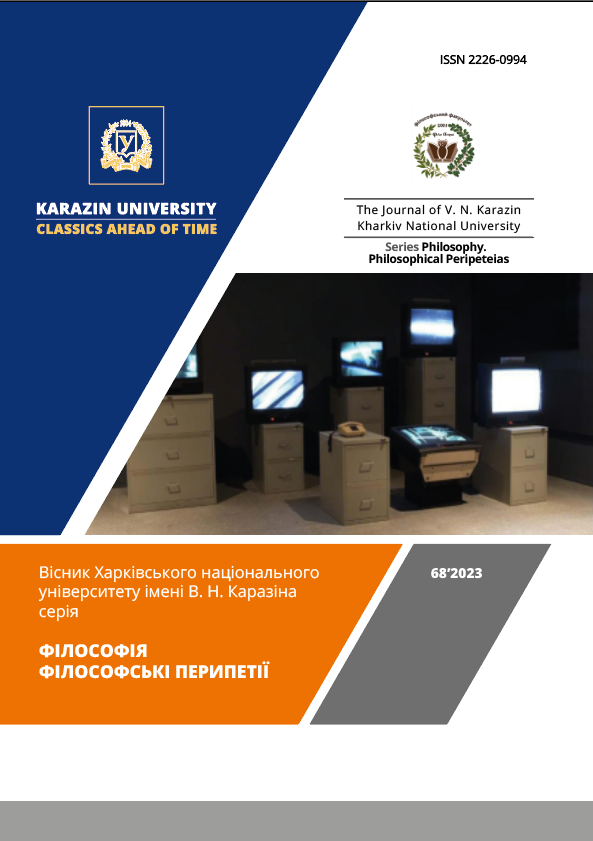THE UKRAINIAN LANGUAGE PROJECT OF UKRAINIAN PHILOSOPHY AND ITS "LEXICON OF UNTRANSLATABLES"
Abstract
The illustrations of the translation of "untranslatables" considered in the article prove the idea that they are not an inconvenience, but a form of enrichment of philosophy, which formats the line of its cumulative development through the production of concepts (Gilles Deleuze, Felix Guattari "What is philosophy?"), as a way of existence of modern philosophy. The concept is determined not only by tradition and the ability to use the "lexicon of untranslatables", but also by language, cultural and political contexts. We substantiate the thesis that the format of the concept dismantles the idea of such a philosophy that is able to speak only in universal languages and emphasize the importance of local philosophies, to which the Ukrainian one belongs. Such importance is manifested in the fact that: national philosophies demonstrate local features of European philosophy; is the transformation and approbation of its ideas in national contexts; creates that "lexicon of untranslatables", the mastery of which teaches philosophy to speak national languages; the national language acquires the ability to become a means of expressing philosophical ideas (Dmytro Chyzhevsky, Oleksander Potebnia); the "lexicon of untranslatables" is modified by the dominant values of the time, embodied in the mentality and culture of the people.
The historical examples and analogies given in the text of the objective symbolic fixation of the translation of philosophical terms in national languages allow us to clarify the options of the linguistic prerequisites of philosophical theories expressed in national languages, and are an argument against the monolingualism of philosophy. The modern translation of "untranslatables" works within the epistemological field of the philosophy of language, shifting the focus from the language code to the discourse, the latter is not a necessary condition for understanding the language, but is a source of destruction of communication or development of those rules, following which makes communication effective. Rejecting the universalist approach and focusing on national strategies, we consider language as a primary source that "pressures" the philosopher, which means that it implies a critique of traditional linguistic ideas about language. The trending topic is the concepts of cultural imperialism, which with the beginning of Russia's aggression against Ukraine became a fact of life for Ukrainians, and the Ukrainian language turned into a weapon of support for this aggression.
Downloads
References
Adamson, P. (2019). Classic philosophy meets Arabic language. Asymptote. Retrieved from: https://www.asymptotejournal.com/blog/2019/03/21/classic-philosophy-meets-arabic-language-a-dialogue-with-prof-peter-adamson/
Bart, R. (1972). Mythologies. New York: Farrar, Straus and Giroux.
Basson, A. H., & O’Connor, D. J. (1947). Language and philosophy: Some suggestions for an empirical approach. Philosophy (London, England), 22(81), 49–65. DOI: https://doi.org/10.1017/S0031819100023329 [Google Scholar]
Benveniste, É. (1966). Problèmes de linguistique Générale. Paris: Gallimard.
Cassin, Barbara (Ed.). (2009). European dictionary of philosophies: a lexicon of untranslatables. Vol. 1. Kyiv: Dukh i litera. (in Ukrainian).
Chyzhevsky, D. I. (1992). Essays on the history of philosophy in Ukraine. Kyiv: Orii pry UKSP «Kobza». (in Ukrainian).
Cicero. (1914). De finibus bonorum et malorum (H. Rackham, Trans.). London: Heinemann.
Crane, Tim. (2015). The philosophy of translation. Times Literary Supplement. Retrieved from: https://www.the-tls.co.uk/articles/the-philosophy-of-translation/
Deleuze, G.; Guattari, F. (1996). What Is Philosophy? New York: Columbia University Press.
Diagne, S. B. (2013). On the postcolonial and the universal? Rue Descartes, 78(2), 7–18. DOI: https://doi.org/10.3917/rdes.078.0007
Durant, W. (1994). Caesar and Christ: A History of Roman Civilization and of Christianity from their Beginnings to A.D. 325. New York: Fine Communications.
Eco, U. (1989). The Open Work. Cambridge: Harvard University Press.
Horskyi, V. S. (1993). Essays on the history of the philosophical culture of Kyivan Rus. Kyiv: Naukova dumka. (in Ukrainian).
Kahn, C. H. (1973). The verb ‘be’ in ancient Greek. Dordrecht: D. Reidel.
Konyskyi, H. (1990). Moral philosophy, or Ethics (Preface). Philosophical works. In 2 vol., 1, pp. 365–385. Kyiv: Naukova dumka. (in Ukrainian).
Lévy, C. (2021). Cicero and the creation of a Latin philosophical vocabulary, pp. 71–87. The Cambridge companion to Cicero’s philosophy. New York: Cambridge University Press. https://doi.org/10.1017/9781108241649.007
Nichyk, V. M., Lytvynov, V. D., Stratii, Ya. V. (1990). Humanist and reformation ideas in Ukraine. Kyiv: Naukova dumka. (in Ukrainian).
Potebnja, O. O. (1976). Language and nationality. Aesthetics and poetics. Moscow: Iskusstvo. (in Russian).
Potebnja, O. O. (1993). Thought and language. Kyiv: SINTO. (in Russian).
Potebnja, O. O. (1995). From notes on the theory of literature. Kharkiv. P.147–149. (in Russian).
Rée, J. (2019). Witcraft: The invention of philosophy in English. New Haven, London: Yale University Press.
Sapir, E. (1924). The grammarian and his language. American Mercury, 1, 149–155.
Suetonius Tranquillus, C. (2004). The Lives of The Twelve Caesars. Kessinger Publishing, LLC.
Sumner, C. (1986). The source of African philosophy: The Ethiopian philosophy of man. Stuttgart: Franz Steiner Verlag.
Tatarkiewicz, W. (1988). Historia filozofii. T. 1. Filozofia starozytna i sredniowieczna. Warszawa: Panstwowe Wydawnictwo Naukowe.
Trubetzkoy, N. S. (1995). The tower of Babel and the confusion of languages. Hystory. Culture. Language. Moscow: Progress-univers. (in Russian).
Ushkalov, L. V. (2001). Ukrainian baroque thinking about God. Seven studies about Hryhorii Skovoroda. Kharkiv: Akta. (in Ukrainian).
Copyright (c) 2023 Надія Корабльова , Ганна Чміль

This work is licensed under a Creative Commons Attribution 4.0 International License.
Authors who publish with this journal agree to the following terms:
- Authors retain copyright and grant the journal right of first publication of this work under the terms of a license Creative Commons Attribution License 4.0 International (CC BY 4.0).
- Authors are able to enter into separate, additional contractual arrangements for the non-exclusive distribution of the journal's published version of the work (e.g., post it to an institutional repository or publish it in a book), with an acknowledgement of its initial publication in this journal.
- Authors are permitted and encouraged to post their work online (e.g., in institutional repositories or on their website) prior to and during the submission process, as it can lead to productive exchanges, as well as earlier and greater citation of published work.






3.gif)




